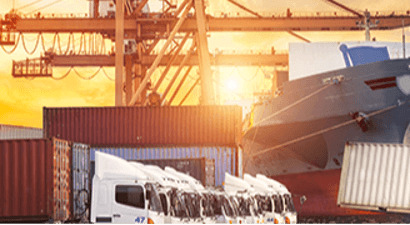New Regulations and their Effects on Trade!
The President, Cyril Ramaphosa, announced on 23 April 2020, that the government has developed an approach that determines what measures should be in place based on the direction of the pandemic in the country. As part of this approach, there will be five coronavirus levels, with Level 5 meaning that the most drastic measures are required to contain the spread of the virus and Level 1 meaning that most normal activity can resume, with precautions and health guidelines followed at all times. To ensure that the response to the pandemic can be as precise and targeted as possible, there will be a national level and separate levels for each province, district and metro in the country. The National Coronavirus Command Council will determine the alert level in place at any given time.
As from 1 May 2020, the coronavirus alert level was lowered from level 5 to level 4. The government has issued new regulations in Government Gazette No. 43258 published on 30 April 2020. These regulations will have the following implications on the logistics industry:
- In terms of Regulation 21: “all borders of the Republic remain closed during the period of Alert Level 4, except for ports of entry designated by the Cabinet member responsible for home affairs and for the transportation of fuel, cargo and goods during the period of Alert Level 4”.
This regulation makes no changes to the current operation parameters of borders.
- In terms of Regulation 22(1), the movement of cargo by rail, ocean, air and road to other countries and within the Republic of South Africa is permitted provided the following goods are being transported:
- essential goods for import as set out in Annexure B to the Regulations, being:
- Food products, including non-alcoholic beverages and animal feed.
- Sanitary pads, sanitary tampons, condoms.
- Hand sanitiser, disinfectants, soap, alcohol for industrial use, household cleaning products, and personal protective equipment, excluding cloth face masks.
- Products for the care of babies and toddlers.
- Personal toiletries, including haircare, body and face care products, roll-ons, deodorants, and dental care products.
- Medical and hospital supplies, medicine, equipment and personal protective equipment (excluding cloth face masks).
- Fuel, including coal, wood, paraffin and gas.
- Hardware, components and supplies.
- Components for aftersales vehicles services.
- Chemicals, packaging and ancillary products used in the production of any these products.
- Textiles required to produce face masks, and other personal protective equipment.
- ICT equipment to facilitate work-from-home arrangements including computers, mobile telephones and other home office equipment.;
- the import of materials and components required for manufacturing activities allowed under Alert Level 4;
- cargo at ports of entry;
- goods cleared at ports of entry for removal in transit through the Republic destined for neighboring countries;
- permitted goods for export as set out in Annexure C to the Regulations;
- Agricultural, agro- processing, forestry and fishing products
- Manufacturing products and mining products permitted for production under the Alert Level 4 table subject to directions issued by the relevant Minister;
- transport of goods within the Republic of South Africa;
- any other goods as set out in Directions by the relevant Cabinet member; taking into account health risks, constrained capacity at ports of entry and other factors relevant to the health; public order and economic effects of Covid -19.
- According to Regulation 22(2): “The Cabinet member responsible for transport, may, after consultation with the Cabinet members responsible cooperative governance and traditional affairs, trade, industry and competition. health, justice and correctional services and public enterprises, issue directions relating to sea cargo operations and air freight operations.”
- According to Regulation 26(3), the transportation of liquor for export purposes is permitted under Alert Level 4.
From a reading of Regulations 22(1)(a) and (b) it seems that the only goods which are permitted to be imported into South Africa, unless otherwise directed by the relevant Cabinet member, are essential goods as set out in Annexure B and components required for the manufacturing or resale of goods allowed under Alert Level 4. This is not practical as it will lead to congestion of ships waiting to dock at South African ports as well as congestion in the ports themselves once these goods are permitted to enter the port.
Regulation 22(1)(c) suggests that all cargo at ports of entry can either be exported or moved through South Africa. The issue with the cargo being moved from the port through South Africa, comes in terms of where the goods are to be delivered. Where essential cargo is concerned, it can be delivered to the consignee. However, where the cargo is not essential goods or components required for the manufacturing or resale of goods allowed under Alert Level 4, it cannot be delivered to the consignee under Alert Level 4, as the consignee is expected to have ceased operations and be closed.
Regulation 22(1)(d) allows for goods cleared at ports of entry for removal in transit through the Republic to be exported to their intended country destination.
Regulation 22(1)(e) allows for the exportation of goods as set out in Annexure C to the Regulations, being the exportation of agricultural, agro-processing, forestry and fishing products as well as manufacturing products and mining products permitted for production under the Alert Level 4 table subject to directions issued by the relevant Minister. The use of Annexure C in this regard, can lead to serious confusion as some might interpret it as only goods depicted in Annexure C can be exported from South Africa, which is not the case, as such an interpretation would lead to a contradiction between Regulation 22(1)(c), Regulation 22(1)(d) and Regulation 22(1)(e). It is more prudent, to include the goods referred to in Annexure C into the list of products in Regulation 22 and remove the Annexure completely.
Regulation 22(1)(f) provides for the movement of goods within the Republic, presumably between provinces, metropolitans and districts.
Businesses, individuals and government are all doing their very best to wade their way through the uncharted waters we now find ourselves in.
Sometimes the Regulations issued by government are broad and vague and are therefore open to interpretation. This is one of those instances. This causes problems as some individuals interpret the regulations strictly whilst the interpretation of others is not so strict.
SARS issues directives as and when the need arises, however by the time the need arises, it is often too late for some importers who, by the time the directive is issued, have already been penalised by the authorities or suffered serious financial prejudice. Furthermore SARS’ interpretation, and that of the South African Police Service (“SAPS”), are not always correct and may require intervention from government.
This is one of those instances where the Regulations are broad and vague and are open to interpretation. What happens where:
- An essential business has imported non-essential goods? Are they able to receive these goods?
- And if they are not permitted to receive the non-essential goods, where are these goods to be stored?
There are no Regulations in this Government Gazette specially preventing essential businesses from receiving non-essential goods or allowing them to receive non-essential goods. However, the fact that any cargo can me moved from the harbour through South Africa, suggests that essential businesses should be permitted to receive non-essential.
This view is supported by practicality and financial implications. In some instances, essential and non-essential goods may be coming from the same place or in the same shipment and therefore it is impractical and more costly to deliver the essential goods to the consignee and not the non-essential goods. Firstly, this will result in more transportation cost and secondly in unnecessary storage costs, which can be avoided if the consignee, being the essential business, can receive both. Further to this, most storage facilities are already at full capacity, with non-essential goods consigned to non-essential businesses, which are currently not operating.
These Regulations are therefore considered very open and require further clarity which should be sort from the relevant authorities for guidance. This will avoid the entity being penalised for a misinterpretation (be it a misinterpretation of the entity, SARS or SAPS).





